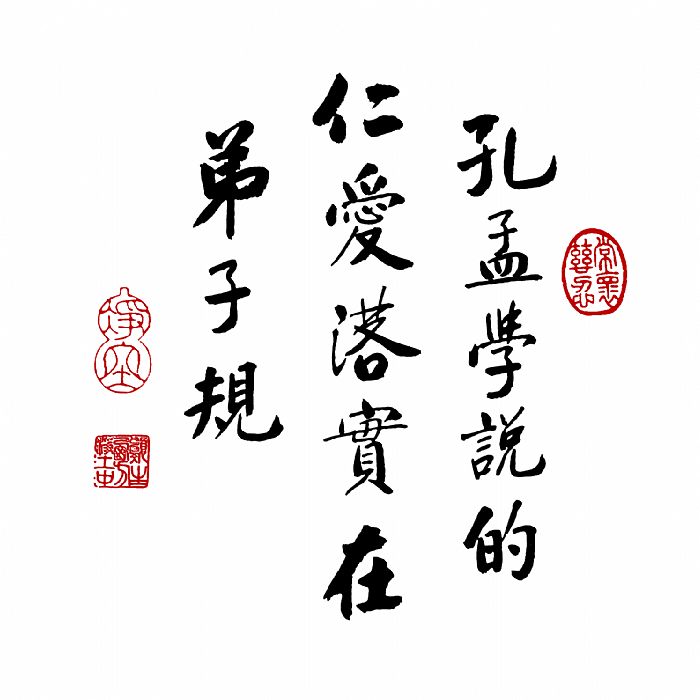Click on picture to see original size. 点击图片可看原图。
Sunday, October 31, 2010
Guidelines & Principles To Ensure A Happier Today And Tomorrow (Part 1 of 7)
【入则孝】RESPECTING AND LOVING OUR PARENTS AT HOME
【父母呼。应勿缓。父母命。行勿懒。】
【父母教。须敬听。父母责。须顺承。】
When our parents call us, we should answer them right away.
When they tell us to do something, we should do it promptly.
When our parents instruct us, we should listen respectfully.
When they scold us, we should sincerely accept what they say.
【冬则温。夏则凊。晨则省。昏则定。】
We should make sure that our parents are warm in the winter and cool in the summer.
In the morning, we should greet them and show them that we care.
At night, we should make sure that they are resting comfortably.
【出必告。反必面。居有常。业无变。】
Before going out, we should let our parents know. When we return, we should tell them we are back.
We should lead a routine life, and we should not be constantly changing our mind in whatever we do.
【事虽小。勿擅为。茍擅为。子道亏。】
【物虽小。勿私藏。茍私藏。亲心伤。】
Even when a matter is trivial, we should not act without permission or just do as we please.
If we do so, then we are no longer a dutiful child.
We should not hide any possession, no matter how small, from our parents.
If we do, they will feel hurt.
【亲所好。力为具。亲所恶。谨为去。】
【身有伤。贻亲忧。德有伤。贻亲羞。】
When something pleases our parents and is proper, we should try our best to provide it for them.
When something displeases them, we should remove it.
If we injure ourselves, we will make our parents worry.
If we do something unvirtuous, they will feel ashamed.
【亲爱我。孝何难。亲憎我。孝方贤。】
When our parents love us, it is easy to be respectful and loving.
When they do not love us, respecting and loving them means we have a noble heart.
【亲有过。谏使更。怡吾色。柔吾声。】
【谏不入。悦复谏。号泣随。挞无怨。】
If our parents do something wrong, we should urge them to change.
Do so with a kind expression and caring voice.
Should our parents not accept our advice, try again when they are in a better mood.
If they still do not listen, our sincere tears will show them how deeply we care.
Should they get angry with us, do not hold it against them.
【亲有疾。药先尝。昼夜侍。不离床。】
【丧三年。常悲咽。居处变。酒肉绝。】
【丧尽礼。祭尽诚。事死者。如事生。】
When our parents are ill, we should make sure that they take the right medicine.
Care for them night and day, and do not leave them alone.
For three years after our parent’s passing, we should remember them in sadness.
We should live simply and not adorn our home. Avoid merry-making, meat, and alcohol.
We should arrange our parent’s funeral in a proper manner.
We should always honor them as if they were still alive and,
especially on the anniversary of their death, remember them with a sincere heart.
【父母呼。应勿缓。父母命。行勿懒。】
【父母教。须敬听。父母责。须顺承。】
When our parents call us, we should answer them right away.
When they tell us to do something, we should do it promptly.
When our parents instruct us, we should listen respectfully.
When they scold us, we should sincerely accept what they say.
【冬则温。夏则凊。晨则省。昏则定。】
We should make sure that our parents are warm in the winter and cool in the summer.
In the morning, we should greet them and show them that we care.
At night, we should make sure that they are resting comfortably.
【出必告。反必面。居有常。业无变。】
Before going out, we should let our parents know. When we return, we should tell them we are back.
We should lead a routine life, and we should not be constantly changing our mind in whatever we do.
【事虽小。勿擅为。茍擅为。子道亏。】
【物虽小。勿私藏。茍私藏。亲心伤。】
Even when a matter is trivial, we should not act without permission or just do as we please.
If we do so, then we are no longer a dutiful child.
We should not hide any possession, no matter how small, from our parents.
If we do, they will feel hurt.
【亲所好。力为具。亲所恶。谨为去。】
【身有伤。贻亲忧。德有伤。贻亲羞。】
When something pleases our parents and is proper, we should try our best to provide it for them.
When something displeases them, we should remove it.
If we injure ourselves, we will make our parents worry.
If we do something unvirtuous, they will feel ashamed.
【亲爱我。孝何难。亲憎我。孝方贤。】
When our parents love us, it is easy to be respectful and loving.
When they do not love us, respecting and loving them means we have a noble heart.
【亲有过。谏使更。怡吾色。柔吾声。】
【谏不入。悦复谏。号泣随。挞无怨。】
If our parents do something wrong, we should urge them to change.
Do so with a kind expression and caring voice.
Should our parents not accept our advice, try again when they are in a better mood.
If they still do not listen, our sincere tears will show them how deeply we care.
Should they get angry with us, do not hold it against them.
【亲有疾。药先尝。昼夜侍。不离床。】
【丧三年。常悲咽。居处变。酒肉绝。】
【丧尽礼。祭尽诚。事死者。如事生。】
When our parents are ill, we should make sure that they take the right medicine.
Care for them night and day, and do not leave them alone.
For three years after our parent’s passing, we should remember them in sadness.
We should live simply and not adorn our home. Avoid merry-making, meat, and alcohol.
We should arrange our parent’s funeral in a proper manner.
We should always honor them as if they were still alive and,
especially on the anniversary of their death, remember them with a sincere heart.
种下什么,收获的就是什么。
Click on picture to see original size. 点击图片可看原图。
播种一个行动,你会收到一个习惯;播种一个习惯,你会收到一个个性;播种一个个性,你会收到一个命运;播种一个善行,你会收到一个善果;播种一个恶行,你会收到一个恶果。
Friday, October 29, 2010
君子有九思
孔子曰:「君子有九思:视思明,听思聪,色思温,貌思恭,言思忠,
事思敬,疑思问,忿思难,见得思义。」
孔子说:「君子有九种要用心思考的事:
看要看得明确,不可以有丝毫模糊。
听要听得清楚,不能够含混。
脸色要温和,不可以显得严厉难看。
容貌要谦虚恭敬有礼,不可以骄傲、轻忽他人。
言语要忠厚诚恳,没有虚假。
做事要认真负责,不可以懈怠懒惰。
有疑惑要想办法求教,不可以得过且过,混过日子。
生气的时候要想到后果灾难,不可以意气用事。
遇见可以取得的利益时,要想想是不是合乎义理?」※ 所谓:『君子爱财,取之有道。』
Thursday, October 28, 2010
Wednesday, October 27, 2010
Tuesday, October 26, 2010
Monday, October 25, 2010
Sunday, October 24, 2010
Friday, October 22, 2010
Thursday, October 21, 2010
Thursday, October 14, 2010
Be Kind & Caring
If we regard all seniors as our parents
and all children as our own as we care for,
protect and guide them,
we will be setting good examples.
Thus, we will attain peace and happiness for all.
Thursday, October 7, 2010
事勿忙 忙多错
《弟子规》云:「事勿忙、忙多错」。
与其在忙乱中出错,不如定心安神,
做事之前充分预备,审慎思维,才能把事情做对、做好。
老师教导时说: 有福之人,心是定的,动作稳重。清末,曾国藩先生在《家训》中,教育子侄,动作要稳重才显得有福。没有福的人急躁,步调很快,走起路来好像在拼命。佛法形容佛菩萨,「那伽常在定,无有不定时」。那伽是梵语,就是大象,大象的动作很慢,走路也很慢,四平八稳。这是形容真正有大福德之人,都是这样的态度与风范,不可能匆匆忙忙,那么急躁!
【步从容。立端正。】
我们走路的仪态,我们站的姿势,我们坐的姿势,都要很从容不迫的。什么叫从容不迫?就是很缓和,很端庄,很稳重。如果走路很急,很匆忙,我们晓得,这个人肯定他的性子就是很急。这样的人给人感觉是没有耐性之人。长官看到这人如此又怎么有可能把重任托付于他?如果在家里性子很急,一定很容易与家人冲突。在外与朋友交往,如果个性很急,也会得罪很多人。若走路、说话、站立的姿势,都给人觉得你很赶,你很匆忙,这样都是不对的。
人性本善找到科学根据
婴儿天生有助人的欲望
人性本善还是性本恶?这已经是一个争论了上千年的话题。但最近,科学家帮助人们找到最终答案。据美联社3日报道,在一个实验中,科学家手里的衣服夹子掉地上了。他不用担心,一个刚学会走路的孩子会过去帮他捡起来,并且还给他。这个简单的实验证明,仅有18个月大的孩子也具有帮助他人的无私品质和能力。
科学家意外的发现,婴儿竟然个个都是助人为乐的「好儿童」
德国一家人类进化研究所致力于寻找人类大脑发育的过程,以及人类协作精神产生的源泉。科学家在实验室中研究一群婴儿面对各种环境时如何反应协作。他们意外地发现,婴儿竟然个个都是助人为乐的「好儿童」。
心理学研究员每天在一群刚刚会爬的婴儿面前作简单的动作,比如用夹子挂毛巾,把书垒成堆。经过一段时间,研究员会故意笨手笨脚地搞砸这些最简单的任务。比如把夹子掉了,或把书堆碰倒了。此时实验室24个婴儿在几秒钟之内,同时都表现出要帮忙的意思。
根据研究录像,一个裹着尿布的婴儿看看研究员的脸色,又看看掉在地上的夹子,马上明白了是怎么回事。他手脚并用地爬过来,抓起夹子,推到研究员脚边。看起来急切的要把夹子递给研究员。婴儿都表现出同样的热诚,似乎非常愿意帮助笨手笨脚的研究员。
在整个实验过程中,研究员从来不主动要求婴儿帮助他,也不说「谢谢」之类的话。因为如果做出感谢等表示,很容易改变研究的初衷,使婴儿在帮助人的同时期望回报。所以整个研究中,婴儿完全展现了真正的利他主义精神,助人而不图回报。
婴儿表现出利他主义的心理证明助人为乐是人的天性使然
3月2日,负责该项研究的德国马克斯·普朗克人类进化研究所的研究员沃内克在《科学》杂志上发表了人类利他主义天性的研究成果。沃内克说,这项研究通过观察人脑复杂的发育过程,揭示出人类「利他主义和合作精神」是如何产生。
沃内克提出,婴儿表现出利他主义的心理至少需要具备两个条件。第一,婴儿大脑发育出足够的认知能力,可以判断别人的真实意图。第二,婴儿发展出「亲社会倾向」,渴望融入社会。一般来说,婴儿到18个月大甚至更早就会具备这两个条件,拥有了助人为乐的品质。
不过沃内克补充道,婴儿助人为乐是有条件的。婴儿们会判断人们是否真的需要帮助。在实验中,如果研究员故意把书碰倒,把夹子丢到地上,婴儿们通常不会伸出援手。
在人类社会中,研究者处处可以找到人性本善的证据。人们为慈善机构捐款,尽力保护环境,在地铁上为老人让座。这些行为除了获得自我满足感,通常不会有任何实质回报。可见助人为乐是人的天性使然。
令科学家不解的是,人类是动物界惟一具有利他行为的动物
科学家得出人类行为的结论后,又把目光转向其他动物。结果发现,人类是动物界惟一具有利他行为的动物。
虽然自然界的很多动物也会互相协作,但往往带有实质的目的。有些动物会成群结队觅食,共同抵抗捕猎者。灵长类动物如大猩猩甚至拥有更多人性化的一面。曾有报道,一个3岁的男孩掉进大猩猩笼子里,大猩猩亲自把男孩递出来。
科学家试图找到大猩猩这种利他主义的动机。他们曾仔细研究了与人类最相近的动物大猩猩的行为和心理。在三四岁大猩猩身上做同样的捡东西实验。结果发现,大猩猩也会捡东西,但缺少主动性。大猩猩的助人动作只限于捡起来,不像婴儿那么急切。
而且如果援助动作比较复杂,大猩猩就会无动于衷。它们不会费劲去捡掉在盒子里的东西。加利福尼亚大学人类学家琼·希尔克说,如果大猩猩能够明白人的意图,也愿意帮助人。但它们助人的理由和婴儿绝对不同。
编辑: 纪惊鸿 文摘自2006年3月北京科技报
编后语:现在有人将「人不为己,天诛地灭」的话挂在嘴上,为自己自私自利的行为找借口。殊不知,「人之初,性本善」,人人皆有恻隐之心,有好善好德之心,有助人为乐之心,这是人的本性,天良啊!违背本性而动,逆自然之道而行,只会活得越来越郁闷、道路越走越窄、离幸福越来越远。
回归本性,道法自然才是我们自己最明智的选择。
文摘自大方广文化公益网
Subscribe to:
Comments (Atom)
































